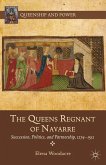This book examines female lordship and the power of the political voice in medieval Northern Europe, focusing on three prominent, foreign-born queens of medieval Scandinavia - Agnes of Denmark (d. 1304), Eufemia of Norway (d. 1312) and Margareta of Denmark/Sweden (d. 1412) - who acted as cultural mediators and initiators of political change.
"In this innovative study, Layher focuses on three late medieval Nordic queens - Agnes of Denmark, Eufemia of Norway, and Margareta of Denmark, Norway, and Sweden - to show how they used their royal voices to augment their authority and advance their political goals in periods of political crisis, specifically, crises of male lordship. Recommended." - CHOICE
"This is a marvelous book, original, insightful and important, in which the author demonstrates how Nordic queens of the thirteenth and fourteenth centuries employed their positions to shape public opinion and the course of history. Layher analyzes how, faced with crises of different sorts, Agnes, Eufemia and Margareta actualize the potential power of their positions through what he calls the skillful instrumentalization of sound and voice. A necessary tonic for those interested in history and culture in the Middle Ages, Queenship and Voice in Medieval Northern Europe offers a fresh, bold examination of the forces at work in it." - Stephen Mitchell, Professor of Scandinavian and Folklore, Harvard University
"Arguing that voice is the marker of lordship, William Layher brings a sophisticated command of the history, languages, and literatures of medieval Scandinavia and literally gives voice to three medieval Scandinavian queens - Agnes of Denmark, Euphemia of Norway, and Margareta of Denmark. Connecting patron, poet, and audience across Scandinavian borders, Layher traces these queens struggle to hold and exercise political agency in moments of crisis, noting that the queen s voice is most evident when the king is silent. An innovative study in terms of theory and the queens studied, Layher s book complicates our understanding of queenship by examining not just the cultural production of texts but also the language of production and, more importantly, the voice of the patron filtered through the poet. It opens up a new dimension in the study of queens, influence, and power. Layher s book resonates with polyvocal echoes of the acoustic interplay between the voice of the queen and the poet who speaks her mind in a dynamic literary and political performance. It is a compelling argument for looking closely not just at literary texts but at the nuances of spoken texts in an aural, oral society." - Theresa Earenfight, Associate Professor of History, Seattle University
"William Layher s innovative and readable study furthers our understanding in key research areas central to contemporary medieval studies: women and lordship; literary studies; and media studies. Proposing a new approach to the problems of gender, voice, and agency, Layher s book contributes to the major paradigm shift in literary studies that is moving the study of women s literary patronage from the margins to the center and by so doing advancing the argument that women's contributions are critical to the growth of vernacular literature in the West. I expect this remarkable book to be widely reviewedand debated for many years to come." - Ann Marie Rasmussen, Professor, Department of Germanic Languages and Literature,DukeUniversity
"This is a marvelous book, original, insightful and important, in which the author demonstrates how Nordic queens of the thirteenth and fourteenth centuries employed their positions to shape public opinion and the course of history. Layher analyzes how, faced with crises of different sorts, Agnes, Eufemia and Margareta actualize the potential power of their positions through what he calls the skillful instrumentalization of sound and voice. A necessary tonic for those interested in history and culture in the Middle Ages, Queenship and Voice in Medieval Northern Europe offers a fresh, bold examination of the forces at work in it." - Stephen Mitchell, Professor of Scandinavian and Folklore, Harvard University
"Arguing that voice is the marker of lordship, William Layher brings a sophisticated command of the history, languages, and literatures of medieval Scandinavia and literally gives voice to three medieval Scandinavian queens - Agnes of Denmark, Euphemia of Norway, and Margareta of Denmark. Connecting patron, poet, and audience across Scandinavian borders, Layher traces these queens struggle to hold and exercise political agency in moments of crisis, noting that the queen s voice is most evident when the king is silent. An innovative study in terms of theory and the queens studied, Layher s book complicates our understanding of queenship by examining not just the cultural production of texts but also the language of production and, more importantly, the voice of the patron filtered through the poet. It opens up a new dimension in the study of queens, influence, and power. Layher s book resonates with polyvocal echoes of the acoustic interplay between the voice of the queen and the poet who speaks her mind in a dynamic literary and political performance. It is a compelling argument for looking closely not just at literary texts but at the nuances of spoken texts in an aural, oral society." - Theresa Earenfight, Associate Professor of History, Seattle University
"William Layher s innovative and readable study furthers our understanding in key research areas central to contemporary medieval studies: women and lordship; literary studies; and media studies. Proposing a new approach to the problems of gender, voice, and agency, Layher s book contributes to the major paradigm shift in literary studies that is moving the study of women s literary patronage from the margins to the center and by so doing advancing the argument that women's contributions are critical to the growth of vernacular literature in the West. I expect this remarkable book to be widely reviewedand debated for many years to come." - Ann Marie Rasmussen, Professor, Department of Germanic Languages and Literature,DukeUniversity








